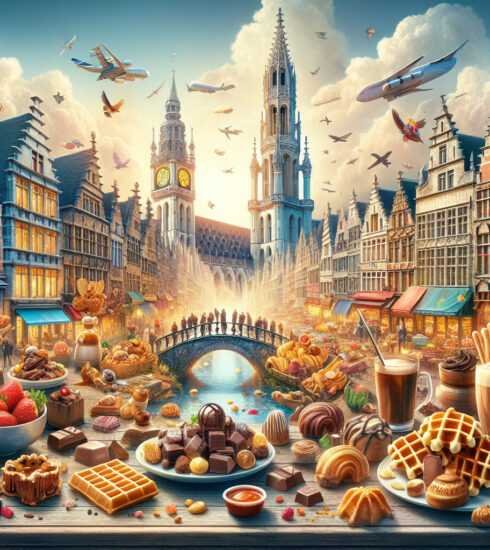Unveiling the Flavors and Traditions of Traditional Belgian Cuisine: An Exquisite Culinary Journey
Introduction
Belgium, a small European country famous for its medieval towns, stunning architecture, and vibrant culture, is also a paradise for food enthusiasts. The country’s culinary scene is diverse, rich, and deeply rooted in tradition. Traditional Belgian cuisine showcases a unique blend of flavors, techniques, and ingredients, making it a gastronomic extravaganza.
In this article, we will delve into the fascinating world of Belgian culinary delights, unveiling the flavors and traditions that make this cuisine so special. From mouthwatering Belgian waffles and indulgent Belgian chocolates to savory moules-frites (mussels with fries) and hearty carbonades flamandes (Flemish beef stew), we will explore the core elements of traditional Belgian cuisine.
The Origins of Belgian Cuisine
Belgian cuisine is a captivating tapestry woven with influences from neighboring countries and historical events. Over the centuries, Belgium has been the crossroads of various cultures, resulting in a unique culinary heritage that combines French finesse, German heartiness, and Dutch pragmatism.
The foundation of Belgian cuisine can be traced back to the medieval times, during the heyday of Flanders as a center of trade and commerce. The wealthy merchant class of Flanders had access to a wide range of luxurious ingredients such as spices, sugar, and exotic fruits, which laid the groundwork for the rich flavors and indulgence we associate with Belgian cuisine today.
During the 17th century, Belgium was ruled by Spain, and Spanish influences seeped into the local cuisine. The introduction of ingredients like tomatoes, peppers, and beans added new flavors and colors to Belgian dishes. This culinary fusion continued to evolve during the French occupation of Belgium in the late 18th and early 19th centuries, when French culinary techniques and traditions left an indelible mark.
Belgium’s geographical location also played a significant role in shaping its cuisine. With access to both the North Sea and fertile agricultural lands, the country became a hub for fishing and farming, providing an abundance of fresh and quality ingredients. The North Sea provides a wide variety of seafood, including mussels, shrimp, and sole, which play a central role in Belgian cuisine.
Today, Belgian cuisine is a fine balance between tradition and innovation. While chefs experiment with modern techniques and global influences, they always remain grounded in the rich heritage and flavors that define traditional Belgian cuisine.

Belgian Culinary Delights
1. Belgian Waffles
No discussion of Belgian cuisine would be complete without mentioning the famous Belgian waffles. These light, fluffy, and slightly sweet treats are beloved around the world. Belgian waffles come in two main varieties: Brussels waffles and Liege waffles.
- Brussels Waffles: Brussels waffles are rectangular in shape and have a crisp texture. They are usually dusted with powdered sugar and served with whipped cream, fresh fruits, or indulgent Belgian chocolate sauce.
- Liege Waffles: Liege waffles are denser and have a chewy texture. They are made with pearl sugar, which caramelizes as the waffles cook, creating a delightful, crunchy sweetness. Liege waffles are often enjoyed as a handheld snack on the go.
Whether enjoyed plain or adorned with delicious toppings, Belgian waffles are a must-try delicacy that perfectly embodies the spirit of Belgian cuisine.
2. Belgian Chocolates
Belgium is renowned for its exquisite chocolates, and Belgian chocolatiers are considered some of the best in the world. The country’s long-standing tradition of chocolate-making dates back to the 17th century when cocoa beans were first brought to Europe from the Americas.
Belgian chocolates are known for their exceptional quality, smooth textures, and intricate designs. The artistry and craftsmanship behind each chocolate creation elevate them to more than just a sweet treat; they are edible works of art.
Belgium produces a wide variety of chocolate types, from creamy milk chocolates to intense dark chocolates and filled pralines. Brussels, in particular, has a reputation as the chocolate capital of the world, with numerous chocolatiers dotting the city.

Interested in learning more about Belgian chocolates? Check out this article: Belgian Delights.
3. Moules-Frites
Moules-frites, or mussels with fries, is a beloved Belgian dish and an integral part of the country’s culinary identity. It combines two iconic elements of Belgian cuisine: fresh seafood and delicious fries.
Belgium’s coastal location provides an abundance of high-quality mussels, which are steamed in a flavorful broth made with white wine, garlic, and herbs. The mussels are typically served with a side of crispy golden fries, accompanied by tangy mayonnaise for dipping.
This classic Belgian dish can be found in restaurants across the country, particularly during the summer months when mussels are in season. It is a delicious and satisfying meal that exemplifies the simplicity and finesse of Belgian cuisine.
4. Carbonades Flamandes
Carbonades flamandes, or Flemish beef stew, is a hearty and comforting dish that showcases the heartiness and depth of flavors found in Belgian cuisine. It is a dish deeply rooted in tradition and enjoyed by generations of Belgians.
The stew is made with tender beef, slowly cooked in a rich beer-based sauce infused with onions, mustard, and aromatic herbs. The long, slow cooking process allows the flavors to meld together, resulting in a dish that is tender, flavorful, and utterly satisfying.
Carbonades flamandes is often served with a side of creamy mashed potatoes or crusty bread, allowing diners to savor every last drop of the delectable sauce. It is a true taste of Belgium and a dish that warms the soul.

Belgian Beer and Spirits
Belgium has a rich brewing tradition that dates back centuries, and the country is known for producing some of the finest beers in the world. Belgian beers are characterized by their diversity, complexity, and the meticulous craftsmanship that goes into their production.
There are over 1,500 different types of beers brewed in Belgium, ranging from crisp lagers and fruity lambics to bold Trappist ales and complex abbey beers. Each beer has its own unique flavor profile, with influences from traditional brewing methods, locally sourced ingredients, and regional brewing traditions.
Trappist beers, which are brewed by monks in Trappist monasteries, hold a special place in Belgian beer culture. These beers are known for their exceptional quality and authenticity, with strict guidelines governing their production.
Belgium is also famous for its strong spirits, such as jenever and advocaat. Jenever is a traditional Belgian gin-like spirit flavored with juniper berries, while advocaat is a creamy liqueur made with eggs, sugar, and brandy. Both spirits are deeply ingrained in Belgian culture and are often enjoyed as digestifs or as ingredients in traditional cocktails.
Curious about the diverse world of Belgian beers? Check out this article: Belgium Brews.
Conclusion
Belgian culinary traditions are as diverse and fascinating as the country itself. From delicate chocolates to hearty stews, and from light, fluffy waffles to crisp, golden fries, Belgian cuisine offers a plethora of flavors and experiences for every palate.
By embracing its historical influences, utilizing high-quality local ingredients, and combining traditional techniques with innovative approaches, Belgian chefs have made a significant impact on the global culinary scene.
So, whether you’re exploring the medieval streets of Bruges, sipping on a Trappist beer in a cozy pub, or indulging in a box of exquisite Belgian chocolates, you can immerse yourself in the flavors and traditions of Belgian cuisine, experiencing firsthand the gastronomic extravaganza that this small European country has to offer.






